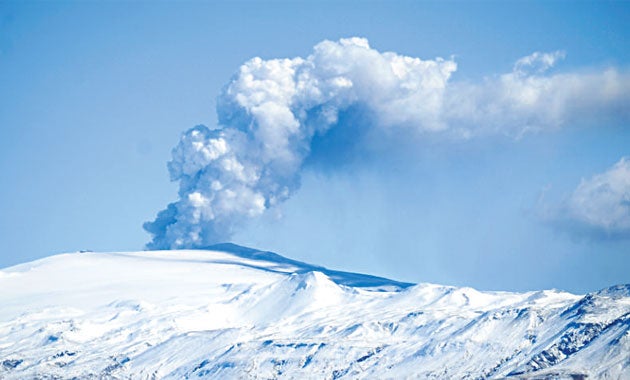Stephen Wood: Why volcanic ash is no match for a good ski company
The man who skis all day

Your support helps us to tell the story
From reproductive rights to climate change to Big Tech, The Independent is on the ground when the story is developing. Whether it's investigating the financials of Elon Musk's pro-Trump PAC or producing our latest documentary, 'The A Word', which shines a light on the American women fighting for reproductive rights, we know how important it is to parse out the facts from the messaging.
At such a critical moment in US history, we need reporters on the ground. Your donation allows us to keep sending journalists to speak to both sides of the story.
The Independent is trusted by Americans across the entire political spectrum. And unlike many other quality news outlets, we choose not to lock Americans out of our reporting and analysis with paywalls. We believe quality journalism should be available to everyone, paid for by those who can afford it.
Your support makes all the difference.Six months ago today, the 2009/10 ski season ended in disarray. The final Saturday of the season in most French, Swiss and Austrian resorts was 16 April, which coincided with the closure of most of Europe's airspace because of the eruption of Eyjafjallajokull.
Every traveller who was affected has their own Icelandic volcano saga. But the best "journey home" tale doesn't involve yacht charter or buying a Vespa, nor any of the other ruses you or your friends came up with; rather, it's about a military-style operation in which 55 coaches fanned out to pick up 2,500 people and drive them – oddly – to Britain's major and regional airports.
It was the breakfast news on Thursday, 15 April, that alerted senior staff of Tui UK's ski-holiday division. As he headed into his office, managing director Mathew Prior suggested everyone should "keep an eye on the situation". By 11.30am, with airport closures sweeping down the UK, the first crisis meeting was under way; two meetings later, at 3pm, it was resolved – after advice from in-house Thomson Airways that returning skiers could face 48-hour flight delays – to bring everyone home by coach and ferry.
On the following morning a message went out to Crystal, Thomson and First Choice customers in the Alps informing them of the plan. The coach pick-ups in France would take place late the following day for an overnight journey to the channel ports, from where ferries were booked for early-Sunday crossings. From Austria there would be two waves of coaches: some would be on a similar timetable to those from France; others would leave very early on Saturday morning and get to Gatwick in the evening.
The evacuation went well. The only hiccups were when one empty, outbound coach was involved in an accident (a replacement was found in France), and another broke down on its way home (the passengers had to spend the night in a hotel). By 6pm on Sunday, all but one coach-load of Tui's customers had returned to their departure airport – where, in most cases, their car was parked. The unfortunate few in the broken-down coach made it back on Monday.
Quick decision-making was critical to the operation's success: tour operators slower off the mark had great difficulty procuring coaches and ferry-tickets. But luck was on Tui's side, too, says Darryl Bushaway, the company's Overseas Service Delivery Manager. "It was fortunate that this was the last weekend of the season: the Italy programme was over, and we were winding down. There were only 2,500 customers in resort, and they were all coming home. On a peak weekend we would have had 10,000 customers heading in both directions. In addition, Crystal [the biggest of Tui's brands] has a two-week break between the winter and summer programmes, so we were entering a quiet period."
Tui's customer text-messaging system, introduced last winter, proved invaluable, too. Intended primarily for communications between customers and local reps, it permitted instant transmission from the UK of instructions and reassurance to people who often didn't even know they were stranded. On the Friday morning, customers were given the details of the evacuation and told to "Enjoy your skiing".
The story doesn't stop there, but only because Mathew Prior likes to repeat it. Not just because it reflects well on his team, but also because it highlights a persuasive advantage of ski holidays bought from package-tour companies such as Tui: in the event of travel disruption, their customers will get home. Skiers making their own arrangements have no such security.
In marketing terms, the ash cloud has a silver lining for others, too. Erna Low, whose business is primarily in resort accommodation and ski/drive holidays, produced an impressive, 32-page document in late August entitled (in part) "Feel the thrill of snowy mountains ... and leave the ash at the airport"; it raised the spectre of further eruptions in Iceland. The company reports that sales are currently five per cent ahead of last year. Erna Low also offers rail travel, which being both ash-resistant and guilt-free (in carbon-emission terms) could expect a boost in the coming season. Certainly the potential is there, thanks to the efforts of Daniel Elkan of Snowcarbon.com in persuading Rail Europe to allocate seats on routes to the Alps for ski tour operators.
All that is needed to herald the new age of the ski train is a puff of smoke from Eyjafjallajokull.
Stephen Wood is Ski Correspondent for The Independent and Executive Editor of Condé Nast Traveller
Join our commenting forum
Join thought-provoking conversations, follow other Independent readers and see their replies
Comments